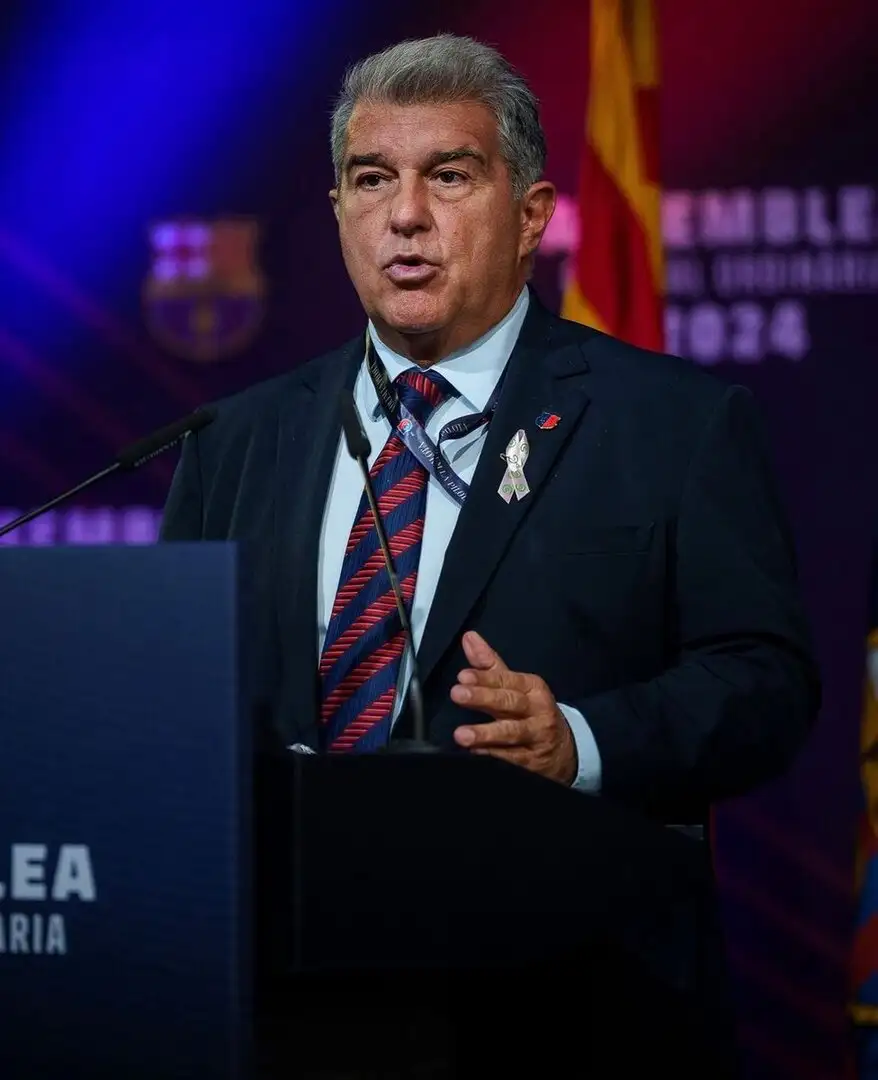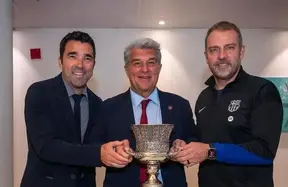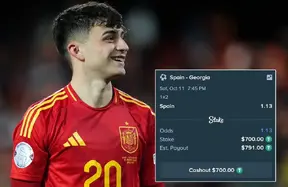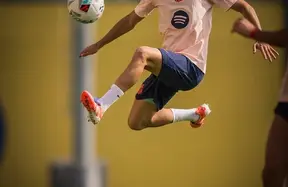Barcelona president Joan Laporta signaled enthusiasm for a planned clash with Villarreal in Miami, framing the United States as a core strategic market for the club and spotlighting the chance to reconnect with a growing American fanbase. The move underscores LaLiga’s broader push to internationalize its product and test demand stateside. Reactions online range from excitement among Miami-based supporters to concerns about travel fatigue and commercial priorities. While logistical and regulatory details remain under evaluation, the event would mark another major step in Europe’s elite clubs deepening ties with U.S. audiences through marquee matchups and sponsor-driven activations.

Barcelona’s leadership publicly expressed gratitude to the league for facilitating a planned matchup against Villarreal in Miami, emphasizing the value of engaging fans in the United States and the club’s ongoing visits to the market. Online discussion quickly followed, with supporters and observers weighing in on the sporting and commercial ramifications of staging the game on American soil.
❗️Joan Laporta on the match against Villarreal in Miami: "We are looking forward to being able to meet again with all our fans in the United States and we thank LALIGA for the opportunity to get closer to one of the main strategic markets for the Club. "We have been visiting
@BarcaUniversal
Impact Analysis
The planned Barcelona–Villarreal game in Miami aligns tightly with the long-term globalization strategies of both clubs and LaLiga. First, the U.S. remains a high-growth territory for European football, with rising broadcast penetration, robust sponsor interest, and strong event-day demand in football-centric cities like Miami. For Barcelona, whose business model relies on worldwide reach and premium partnerships, a stateside showcase can deliver new hospitality inventory, sponsor activations, and incremental merchandise sales—especially around star-driven narratives and academy talents that resonate with younger audiences.
Second, LaLiga gains brand equity by staging marquee clubs in a market where the Premier League has historically dominated mindshare. A successful, well-attended event could help renegotiate future U.S. media rights on stronger terms, while also creating a template for periodic matches that balance competitive integrity with international exposure.
However, travel logistics, player workload, and competitive balance are valid concerns. Long-haul flights compress recovery windows and may provoke pushback from traditionalists who prefer home-and-away symmetry in Spain. Regulatory sign-off and scheduling become pivotal—particularly to safeguard fair rest periods and training rhythms. Even with these challenges, the upside is substantial: new fan conversion, enhanced data capture for CRM, and deeper sponsor storytelling. If executed with medical oversight and clear scheduling buffers, the sporting impact can be mitigated while the commercial benefits compound across future seasons.
Reaction
Online sentiment spans a broad spectrum. Miami-based fans celebrate the opportunity to see Barcelona up close, anticipating a festival atmosphere and high-caliber football. Comments highlight the city’s readiness for a global event and the club’s star power, framing the occasion as a once-in-a-season showcase. Marketing-savvy supporters praise Joan Laporta’s insistence on the U.S. as a strategic pillar, calling the move a smart, revenue-positive step that fits Barcelona’s global brand and LaLiga’s expansion goals.
On the flip side, traditionalists question the travel burden and competitive fairness, suggesting the hours spent in transit could dent player freshness. Some label the decision as excessively commercial, prioritizing income over on-field equilibrium. A subset of comments veers into broader political talking points unrelated to the match but reflective of how U.S.-based events can intersect with local discourse. There’s also a nostalgic chorus invoking Lionel Messi, interpreting the Miami setting as a symbolic bridge to the club legend’s current orbit and a reminder of what once electrified Barcelona fandom.
Overall, enthusiasm among U.S. supporters and commercially minded fans is palpable, while skepticism persists among those wary of fixture congestion and the drift from Spain-based home crowds. The debate underscores the tension between modern football’s global reach and its domestic roots.
Social reactions
Sorry laporta, but thats just BULLSHIT
TheBarcaguy (@zulfazalhaider)
is it Barca’s home game ? And the profit from ticket sales will go to whom ?
Football Fan (@Footballl_Xtra)
Laporta as usual selling the club and its fans off for profit. The difference between a big club and a broke one is exactly this
Hala Los Blancos (@losblancoshala)
Prediction
If approvals and scheduling align, expect a sold-out crowd in Miami, heavy sponsor visibility, and a matchday programmed as a full-scale entertainment product—fan zones, youth clinics, and cross-promotions with North American partners. Barcelona will likely leverage the occasion to spotlight its next-gen talents and deepen relationships with U.S. broadcasters, while Villarreal can amplify its profile beyond Spain, converting casual viewers into followers.
Sporting-wise, coaching staffs may rotate lineups to manage jet lag, lean on sports science for sleep and hydration protocols, and minimize soft-tissue risks. Expect tactical pragmatism: controlled pressing, longer in-possession spells, and bench depth determining late-game tempo. In communications, executives will frame the event as a template for future overseas fixtures, tied to fan access and league growth. Should regulatory hurdles intensify, a contingency could see the date repositioned as a high-profile exhibition without losing sponsor momentum.
Medium term, anticipate more Spanish clubs exploring U.S. dates aligned with international breaks, preseason tours, or neutral-site showcases. Data harvested from ticketing and digital engagement will inform targeted campaigns across key U.S. metros. If the Miami match lands cleanly, it becomes a benchmark for frequency—perhaps one to two marquee fixtures per season in North America, calibrated around calendar windows that respect competitive balance at home.
Latest today
- Manchester United eye Manu Koné for summer 2026 - a made-to-measure fit for Amorim's midfi...
- Ruben Amorim aligns with Jason Wilcox as Man United sharpen January transfer plan
- Ruben Amorim on 3-4-3: identity first - what it means for Manchester United and player rol...
- Amorim flags United injury crisis - Bruno, Mainoo, De Ligt, Maguire and Mount doubtful
Conclusion
The planned Miami clash represents a modern football calculus: maximize global touchpoints without compromising the core sporting product. Barcelona stands to strengthen its U.S. footprint, converting soft fandom into lasting loyalty through immersive experiences, sponsor integrations, and direct-to-consumer initiatives. Villarreal, meanwhile, benefits from unprecedented reach, positioning its footballing identity in front of a broader audience that often gravitates to established giants.
Critics’ concerns about travel and competitive equity remain legitimate, demanding meticulous scheduling, medical oversight, and transparent communication. Yet the commercial case is compelling: premium gate receipts, hospitality tiers, and differentiated broadcast packaging can deliver outsized returns, while LaLiga’s brand equity expands in a strategically vital market.
Handled correctly, Miami becomes less an outlier and more a blueprint. The key is balance: preserve domestic traditions, protect athlete welfare, and build a predictable framework for overseas fixtures. Do that, and the league can scale global engagement without eroding the competitive fabric that makes these clubs appointment viewing in the first place.













TheBarcaguy
Sorry laporta, but thats just BULLSHIT
Football Fan
is it Barca’s home game ? And the profit from ticket sales will go to whom ?
mmanuel
Rubbish
Oyinlola Sanmi
Lmao
Hala Los Blancos
Laporta as usual selling the club and its fans off for profit. The difference between a big club and a broke one is exactly this
Hommie Riches
That’s huge for Barça 🇺🇸🔥. Playing an official LaLiga match in Miami is more than football; it’s a statement of global ambition and connection with fans abroad. The U.S. market is about to feel the full Barça experience. 💙❤️
BardiaT
Damn.. this game should have never gone abroad. Must have stayed on the Spanish soil.
ask.teiger♣️♠️
This is useless believe me, think of the hours of travelling man
Zlatan Mph 🇸🇩🇵🇸🇨🇩
Truly disgusting
Çuler Cofi
in short: Messi please come
Masha
Miami fans are in for an epic Barcelona experience
Masha
Laporta really highlighting the global vision
Hunsaifu
Barca looking for a way to get income 👀
max acs
Let's go 🔥
Olusegun Olulana
Laporta sounds thrilled. Barça taking an official match to Miami is a huge move for their U.S. fanbase and global reach. 🌴🔵🔴
MrDwin 👨🎨🇺🇸🃏
I Ama Barca fan but I think this is so terrible
Olusegun Olulana
W
Olusegun Olulana
👀
Skillie
Great strategic marketing opportunity for the club— Laporta at it again 💯
The Combat Sport Poll Guy
Here we goo
Moderate Party.net
"Better Politics Eventually" • K-Jobs Education • Pro-Guns & Borders • Pro-Obamacare • Pro-Faith/Family • Pro-Pot • Pro-Sustainability • Pro-Diversity • Instant Run-off Voting • Pre-Natal Incubation
Brad Thomas
The first iREIT® logo, circa 2014 (Long $IRET)